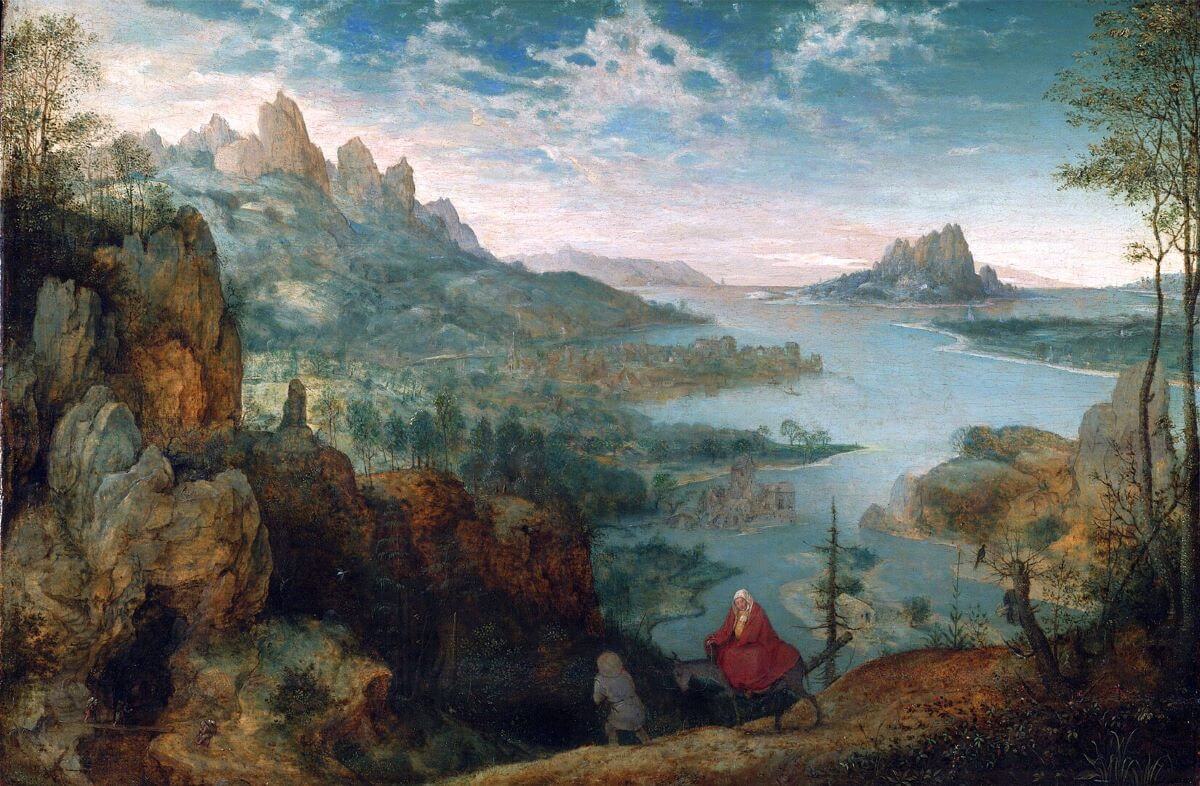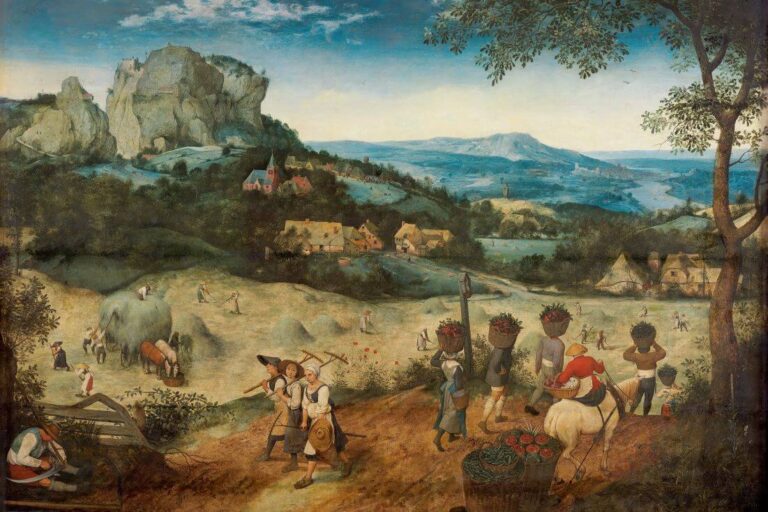As a lover of Baroque music, for years it has been my New Year’s resolution to listen to Bach’s cantatas in order of the liturgical year, but I sadly never managed to do so. So what better way to kick off this year than with the cantata Bach wrote for the first Sunday after New Year’s Day: Ach Gott, wie manches Herzeleid, BWV 58. It is a strikingly beautiful, short cantata, despite its sober setting, for it is scored for just two voices and strings. It has been suggested that Bach did so to give his musicians some time off after the busy Christmas period and before the upcoming Epiphany festivities. As with all his church cantatas, Bach composed for specific liturgical occasions and thus had to take into account the prescribed readings of that particular day. In this case, the sermon was about Joseph and Mary’s Flight into Egypt, after Herod had ordered all male children to be killed.
“And when they were departed, behold, the angel of the Lord appeareth to Joseph in a dream, saying, Arise, and take the young child and his mother, and flee into Egypt, and be thou there until I bring thee word: for Herod will seek the young child to destroy him.”
Matthew 2:13 (Trans. King James Version)
The cantata Ach Gott, wie manches Herzeleid revolves around two concepts: earthly suffering and heavenly salvation. On the one hand, the Massacre of Innocents represents the worldly suffering we all have to face, but on the other hand, Jesus’ escape into safety signifies the possibility of salvation. Written as a dialogue between the faithful’s Soul (soprano) and Christ (bass), the cantata expresses the hope of transcending our earthly suffering by one day entering the kingdom of God. Like in all of Bach’s dialogue cantatas, it expresses the longing to be united with Christ (see mysticism).
“[In the cantata], temporal suffering is contrasted with heavenly joy. And in the
Alfred Dürr, The Cantatas of J.S. Bach, 169
second movement, the whole Gospel account of the flight into Egypt is briefly
reiterated before becoming the subject of a topical re-interpretation in the
fourth: even if the world hates me, God will one day lead me into another land,
the land of eternal salvation.”

The opening duet beautifully expresses this eternal conflict between suffering and salvation, between hope and despair. The soprano opens with a lamentation on her suffering (Ach Gott, wie manches Herzeleid), but even before she can finish, the vox Christi interrupts her mid-sentence to console her (Nur Geduld, Geduld, mein Herze). Before she can fall into despair, Christ is there to comfort her. The interweaving lines make for a touching and lively duet, as if it was an actual conversation that we are listening to. In the following recitative, the bass again consolingly affirms the that he will not forsake her (so will ich dich doch nicht verlassen / noch versäumen).
The central soprano aria marks the turning point of the cantata, in which the faithful has come to terms with her suffering (Ich bin vergnügt in meinem Leiden) and envisions the kingdom of heaven towards which God will lead her (so weist mir Gottes Hand / ein andres Land). With the last line, Bach echoes the Flight into Egypt, of God leading Joseph and Mary to safety, as a metaphor for God guiding us to salvation. At the end of the cantata, the soprano and bass again join in a duet. Earthly suffering is again juxtaposed with heavenly bliss (hier ist Angst, dort Herrlichkeit!), but this time around she has truly come to terms with her misery, for she knows she will be united with Christ. And the joy of knowing that eternal life in heaven awaits her outweights all this short-lived suffering on earth (Und die Freude jener Zeit / Überwieget alle Schmerzen).
In these times of turmoil, we are more than ever in need of comforting. Confronted by the rise of populist parties, increasingly disprutive inequality, and armed conflicts around the globe, we need to remain hopeful that a brighter future still lies ahead of us. In this cantata, Bach beautifully expresses what we all have to go through in life: to despair, to cry for help, and to transcend our suffering. It is a timeless expression of the human condition, one that never fails to comfort me.
Text and Translation
1. Aria and Chorale (Soprano, Bass)
Ach Gott, wie manches Herzeleid
Nur Geduld, Geduld, mein Herze,
begegnet mir zu dieser Zeit!
es ist eine böse Zeit!
Der schmale Weg ist Trübsals voll,
Doch der Gang zur Seligkeit
den ich zum Himmel wandern soll.
führt zur Freude nach dem Schmerze.
Nur Geduld, Geduld, mein Herze,
Es ist eine böse Zeit!
Ah God, what deep affliction
Patience, patience, O my heart,
befalls me at this time!
these are bad times!
The narrow path is full of sorrow
Yet the path to salvation
on which I must go to Heaven.
leads to joy after pain.
Patience, patience, O my heart,
these are bad times
2. Recitative (Bass)
Verfolgt dich gleich die arge Welt,
so hast du dennoch Gott zum Freunde,
der wider deine Feinde
dir stets den Rücken hält.
Und wenn der wütende Herodes
das Urteil eines schmähen Todes
gleich über unsern Heiland fällt,
so kommt ein Engel in der Nacht,
der lässet Joseph träumen,
dass er dem Würger soll entfliehen
und nach Ägypten ziehen.
Gott hat ein Wort, das dich vertrauend macht.
Er spricht: ‘Wenn Berg und Hügel niedersinken,
wenn dich die Flut des Wassers will ertrinken,
so will ich dich doch nicht verlassen
noch versäumen.
Though the wicked world persecutes you,
you still have God as a friend,
who, in the face of your foes,
will always support you.
And even though furious Herod
sentenced our Saviour
to shameful death,
there came an angel in the night
and sent a dream to Joseph,
that He should escape the butcher
and flee into Egypt.
God’s Word gives you confidence.
He saith: when hills and mountains crumble,
when flood waters submerge you,
I shall neither leave you
nor forsake you.
3. Aria (Soprano)
Ich bin vergnügt in meinem Leiden,
denn Gott ist meine Zuversicht.
Ich habe sichern Brief und Siegel,
und dieses ist der feste Riegel,
den bricht auch selbst die Hölle nicht.
I am content in my suffering,
for God is my reassurance.
I have a trustworthy seal and charter,
and this is the solid bolt
that Hell itself cannot break.
4. Recitative (Soprano)
Kann es die Welt nicht lassen,
mich zu verfolgen und zu hassen,
so weist mir Gottes Hand
ein andres Land.
Ach! könnt es heute noch geschehen,
dass ich mein Eden möchte sehen!
Though the world cannot refrain
from persecuting and hating me,
God’s hand reveals to me
another land.
Ah, could it but come to pass today
that I might behold my Eden!
5. Aria with Chorale (Soprano, Bass)
Ich hab für mir ein schwere Reis
Nur getrost, getrost, ihr Herzen,
zu dir ins Himmels Paradeis,
hier ist Angst, dort Herrlichkeit!
Da ist mein rechtes Vaterland,
Und die Freude jener Zeit
daran du dein Blut hast gewandt.
Überwieget alle Schmerzen.
Nur getrost, getrost, ihr Herzen,
hier ist Angst, dort Herrlichkeit!
I have a difficult journey to go
Be consoled, consoled, O hearts,
to reach Thee in heaven’s paradise;
here is fear, there glory reigns!
that is my true fatherland,
And the joy of that day
for which Thou hast shed Thy blood.
outweighs all pain.
Be consoled, consoled, O hearts,
here is fear, there glory reigns!



